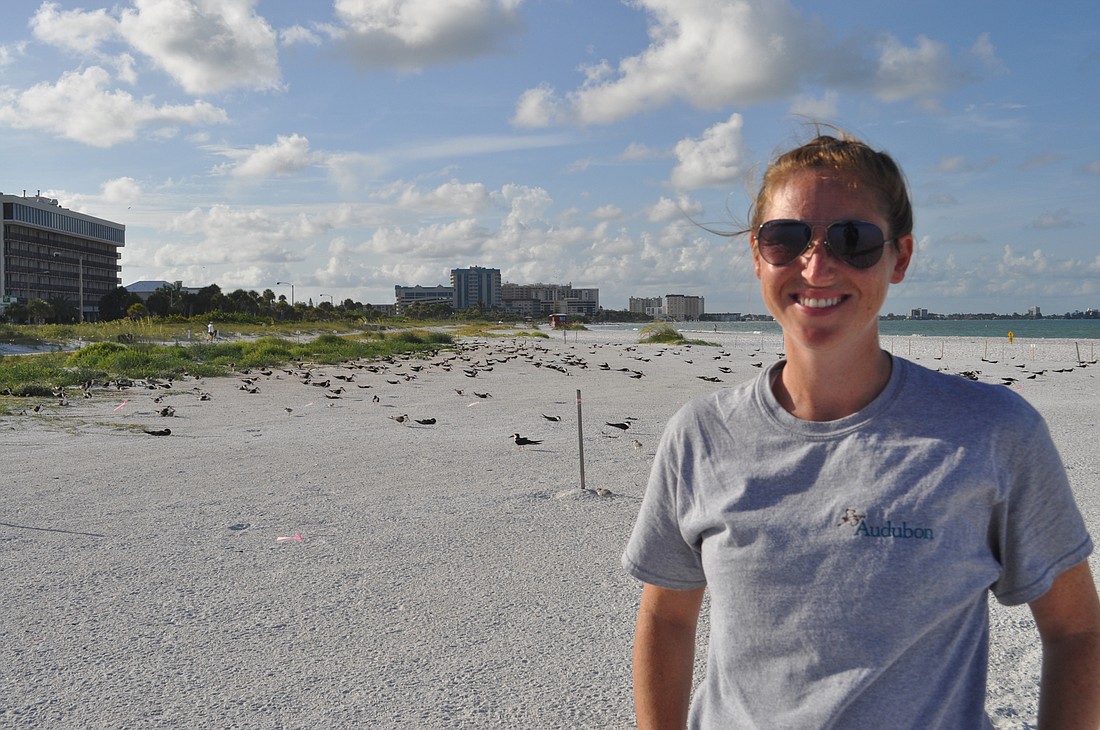- November 24, 2024
-
-
Loading

Loading

Last month, like many visitors to Lido Key, Patricia and Joel Fein were drawn to a roped-off section of the beach that served as a home for hundreds of birds.
Thanks to a conversation with a representative for the Sarasota County Audubon Society, the Feins received a quick rundown of the flock's backstory. Last year, the beach became home to a colony of black skimmers, a “species of special concern” in Florida thanks to habitat destruction.
Right now, it’s nesting season for the birds. The entire process — from egg-laying to hatching to flying — takes about two months for a black skimmer chick. Given the location of this colony, right near the first access point to the beach coming off of St. Armands Circle, it’s a source of intrigue for beachgoers. At the same time, that makes the presence of attentive human stewards crucial for the continued survival of the colony.
For about a month, inspired by their initial run-in with the birds, the Feins have served as stewards — volunteers who monitor the colony and educate beachgoers — for at least one two-hour shift every week. They have no background in ornithology; even now, they’re not entirely clear on some of the finer details of the nesting process. Still, the two felt inspired to help out after learning how vulnerable the colony would be if threatened by human activity.
“They don’t have the option to say, ‘I’m going to move,” Patricia Fein said. “This is where they need to be, and I think it’s our responsibility to help protect it.”
“They can’t speak for themselves, really,” Joel Fein added.
"This is where they need to be, and I think it’s our responsibility to help protect it." — Patricia Fein
The upcoming Fourth of July holiday is a crucial moment for the stewards watching over the black skimmer colony. Holley Short, the Audubon Society’s bird steward coordinator, sent a message to volunteers last week regarding a critical need for individuals willing to monitor the colony over the weekend.
The timing, Short explains, is unfortunate: During a period where the beach will see an uptick in activity, many of the chicks are reaching the point of maturity where they’re beginning to roam away from the colony toward the water. Although there are signs warning visitors to keep an eye out for the “chick crossing” pathway, more needs to be done to ensure the safety of the young animals.
“There are huge boat races on Lido Key, and there are going to be personal fireworks set off,” Short said. “Any volunteers that can come out and help us and educate the public and be there for the birds — the more help the better.”
The presence of the skimmer colony on Lido speaks to how things can go wrong. Until last year, Short said, these skimmers made their annual colony on Siesta Key, instead. In 2014, the birds abandoned the Siesta colony after a human-related disturbance on the busier beach. They made a new home on Lido later in the season.
Although Lido is a quieter home that the birds seem to have embraced, Short said there are still potential pitfalls that must be avoided. Because the birds are new to the area, many Lido beachgoers aren’t familiar with the black skimmers and may not be aware of the proper process for interacting with them.
Some of the best practices may seem like common sense, although even those can be violated without proper education. Last week, Short received a report from a steward that people were picking up the chicks, a major no-no. Beyond that, volunteers such as the Feins — who Short recruited herself — have a relatively straightforward job.
“It’s just a matter of education,” Joel Fein said. “The little I know is enough to tell (beachgoers) what’s going on.”
Making sure frisbees or beach balls don't land within the roped-off area is a simple task. Other problems can be less obvious, Patricia Fein said. She was surprised to learn that kites flying near the colony could be harmful, because the birds might perceive the shadow as from a predator bird.
Although the chicks, which lack the distinctive black feathering of the mature birds, are in need of supervision, the adult birds are often able to provide that on their own. If a human is getting too close to a chick, the adults may exhibit a “broken-wing display,” designed to draw attention to itself instead of the younger animals. If you’re less lucky, the adults might just divebomb you. Either way, they’re trying to send a message: Back off.
“Anybody who comes out here to enjoy the beach, they can also enjoy the birds — from a safe distance,” Short said.